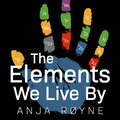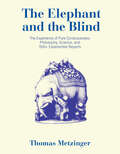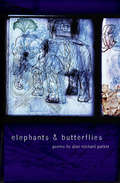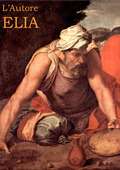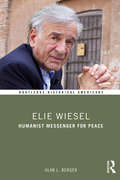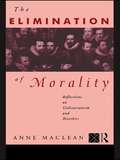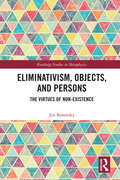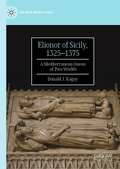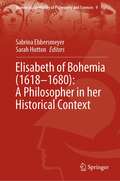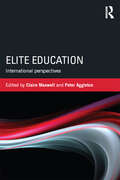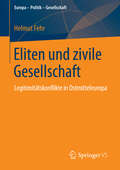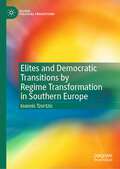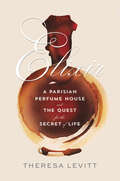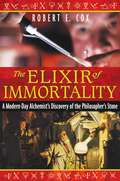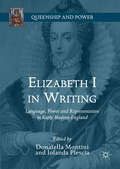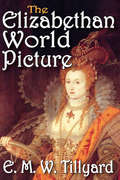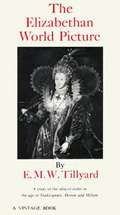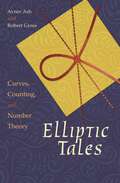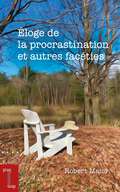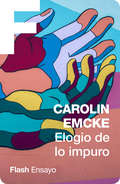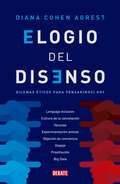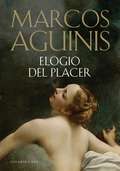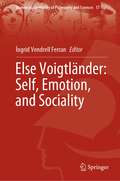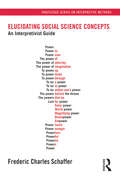- Table View
- List View
The Elements We Live By: How Iron Helps Us Breathe, Potassium Lets Us See, and Other Surprising Superpowers of the Periodic Table
by Anja RøyneWINNER OF THE 2018 BRAGE PRIZE'[T]his lovely book. An enjoyable sweep through topics ranging from respiration to space exploration -solid science presented in an engagingly human way' Andrew Crumey, author of The Great Chain of Unbeing'Perfect popular science . . . not just a well-written story about the elements, but a book about being human in the world today'Åsmund H. Eikenes, author of Splash: A History of Our BodiesWe all know that we depend on elements for survival - from oxygen in the air we breathe to carbon in the molecular structures of all living things. But we seldom appreciate how, say, phosphorus holds our DNA together or how potassium powers our optic nerves enabling us to see.Physicist and award-winning author Anja Røyne takes us on an astonishing journey through chemistry and physics, introducing the building blocks from which we humans - and everything else in the world - are made. Not only does Røyne explain why our bodies need iron, phosphorus, silicon, potassium and many more elements in just the right amounts in order to function, she also shows us where in the world these precious elements are found (some of them in limited and quickly depleting quantities).Røyne helps us understand how precariously balanced our lives - and ways of living - really are, and to appreciate little known and generally unsung heroes of the periodic table in an entirely new light.
The Elephant and the Blind: The Experience of Pure Consciousness: Philosophy, Science, and 500+ Experiential Reports
by Thomas MetzingerAn engaging and insightful journey into human consciousness.What if our goal had not been to land on Mars, but in pure consciousness? The experience of pure consciousness—what does it look like? What is the essence of human consciousness? In The Elephant and the Blind, influential philosopher Thomas Metzinger, one of the world's leading researchers on consciousness, brings together more than 500 experiential reports to offer the world's first comprehensive account of states of pure consciousness. Drawing on a large psychometric study of meditators in 57 countries, Metzinger focuses on &“pure awareness&” in meditation—the simplest form of experience there is—to illuminate the most fundamental aspects of how consciousness, the brain, and illusions of self all interact.Starting with an exploration of existential ease and ending on Bewusstseinskultur, a culture of consciousness, Metzinger explores the increasingly non-egoic experiences of silence, wakefulness, and clarity, of bodiless body-experience, ego-dissolution, and nondual awareness. From there, he assembles a big picture—the elephant in the parable, from which the book&’s title comes—of what it would take to arrive at a minimal model explanation for conscious experience and create a genuine culture of consciousness. Freeing pure awareness from new-age gurus and old religions, The Elephant and the Blind combines personal reports of pure consciousness with incisive analysis to address the whole consciousness community, from neuroscientists to artists, and its accessibility echoes the author&’s career-long commitment to widening access to philosophy itself.
Elephants & Butterflies (American Poets Continuum #111)
by Alan Michael ParkerElephants & Butterflies combines the imaginative forays of The Vandals with the more meditative approach of Love Song with Motor Vehicles. Both wild and calm, boisterous and quiet, the poems in Elephants & Butterflies use surprise, song, and startling metaphor while allowing the ideas to simmer just below the surface of the lyric. The poems manage the difficult task of being highly readable and accessible, while still containing complex philosophical and personal knowledge.Alan Michael Parker (www.amparker.com) teaches at Davidson College in Davidson, North Carolina. He also teaches at Queens University, where he is core faculty in the low-residency MFA program.
Elia
by Alfonso Colmenares Domenico RiccioUn escrito arcaico; un cuento implacable, lento y denso de un sueño; una novela inteligente, desprovisto de la historia y el desarrollo narrativo, circular y sin movimiento y sin embargo sugerente, llena de un caleidoscopio semántico, es decir, marcado con la cadena y la mezcla en lugar de a la lista y la descripción, en prosa rítmica y un canto, hermético y expresionista; un libro escrito sobre la roca; pura y simple; sin principio y sin fin; eterno.
Elie Wiesel: Humanist Messenger for Peace (Routledge Historical Americans)
by Alan L. BergerElie Wiesel: Humanist Messenger for Peace is part biography and part moral history of the intellectual and spiritual journey of Elie Wiesel, a Holocaust survivor, human rights activist, author, university professor, and Nobel Peace Prize winner. In this concise text, Alan L. Berger portrays Wiesel’s transformation from a pre-Holocaust, deeply God-fearing youth to a survivor of the Shoah who was left with questions for both God and man. An advisor to American presidents of both political parties, his nearly 60 books voiced an activism on behalf of oppressed people everywhere. The book illuminates Wiesel’s contributions in the areas of religion, human rights, literature, and Jewish thought to show the impact that he has had on American life. Supported by primary documents about and from Wiesel, the volume gives students a gateway to explore Wiesel’s incredible life. This book will make a great addition to courses on American religious or intellectual thought.
The Elimination of Morality: Reflections on Utilitarianism and Bioethics
by Anne MacleanFirst published in 1993. Routledge is an imprint of Taylor & Francis, an informa company.
Eliminativism, Objects, and Persons: The Virtues of Non-Existence (Routledge Studies in Metaphysics)
by Jiri BenovskyIn Eliminativism, Objects, and Persons, Jiri Benovsky defends the view that he doesn't exist. In this book, he also defends the view that this book itself doesn't exist. But this did not prevent him to write the book, and although in Benovsky's view you don't exist either, this does not prevent you to read it. Benovsky defends a brand of non-exceptionalist eliminativism. Some eliminativists, typically focusing on ordinary material objects such as chairs and hammers, make exceptions, for instance for blue whales (that is, living beings) or for persons (that is, conscious organisms). Benovsky takes one by one all types of allegedly existing objects like chairs, whales, and persons and shows that from the metaphysical point of view they are more trouble than they are worth—we are much better off without them. He thus defends an eliminativist view about ordinary objects as well as the 'no-Self' view, where he explores connections between metaphysics, phenomenology, and Buddhist thought. He then also considers the case of aesthetic objects, focusing on musical works and photographs, and shows that the claim of their non-existence solves the many problems that arise when one tries to find an appropriate ontological category for them, and that such an eliminativist view is more natural than what we might have thought. The arguments provided here are always topic-specific: each type of entity is given its own type of treatment, thus proving a varied and solid foundation for a generalized, non-exceptionalist, full-blown eliminativist worldview.
Elionor of Sicily, 1325–1375: A Mediterranean Queen of Two Worlds (The New Middle Ages)
by Donald J. KagayElionor of Sicily, 1325–1375: A Mediterranean Queen’s Life of Family, Administration, Diplomacy, and War follows Elionor of Sicily, the third wife of the important Aragonese king, Pere III. Despite the limited amount of personal information about Elionor, the large number of Sicilian, Catalan, and Aragonese chronicles as well as the massive amount of notarial evidence drawn from eastern Spanish archives has allowed Donald Kagay to trace Elionor’s extremely active life roles as a wife and mother, a queen, a frustrated sovereign, a successful administrator, a supporter of royal war, a diplomat, a feudal lord, a fervent backer of several religious orders, and an energetic builder of royal sites. Drawing from the correspondence between the queen and her husband, official papers and communiques, and a vast array of notarial documents, the book casts light on the many phases of the queen’s life.
Elisabeth of Bohemia (Women in the History of Philosophy and Sciences #9)
by Sabrina Ebbersmeyer Sarah HuttonThis book showcases Elisabeth of Bohemia, Princess Palatine (1618-1680), one of the foremost female minds of the 17th century. Best known today for her important correspondence with the philosopher René Descartes, Elisabeth was famous in her own time for her learning, philosophical acumen, and mathematical brilliance. She was also well-connected in the seventeenth-century intellectual circles. Elisabeth’s status as a woman philosopher is emblematic of both the possibilities and limitations of women's participation in the republic of letters and of their subsequent fate in history. Few sources containing her own views survive, and until recently there has been no work on Elisabeth as a thinker in her own right. This volume brings together an international team of scholars to discuss her work from a cross-disciplinary perspective on the occasion of her fourth centenary. It is the first collection of essays to examine a range of her interests and to discuss them in relation to her historical context. The studies presented here discuss her educational background, her friendships and contacts, her interest in politics, religion, and astronomy, as well as her views on politics, her moral philosophy and her engagement with Cartesianism. The volume will appeal to historians of philosophy, historians of political thought, philosophers, feminists and seventeenth-century historians.
Elite Education: International perspectives
by Peter Aggleton Claire MaxwellElite Education – International Perspectives is the first book to systematically examine elite education in different parts of the world. Authors provide a historical analysis of the emergence of national elite education systems and consider how recent policy and economic developments are changing the configuration of elite trajectories and the social groups benefiting from these. Through country-level case studies, this book offers readers an in-depth account of elite education systems in the Anglophone world, in Europe and in the emerging financial centres of Africa, Asia and Latin America. A series of commentaries highlight commonalities and differences between elite education systems, and offer insights into broader theoretical issues, with which educationalists, researchers and policy makers are engaging . With authors including Stephen J. Ball, Donald Broady, Rubén Gaztambide-Fernández, Heinz-Hermann Krüger, Maria Alice Nogueira, Julia Resnik and Agnès van Zanten, the book offers a benchmark perspective on issues frequently glossed over in comparative education, including the processes by which powerful groups retain privilege and ‘elite’ status in rapidly changing societies. Elite Education – International Perspectives will appeal to policy makers and academics in the fields of education and sociology. Simultaneously it will be of special relevance to post-graduates enrolled on courses in the sociology of education, education policy, and education and international development.
Eliten und zivile Gesellschaft
by Helmut FehrIn dieser Studie werden Eliten in Ostmitteleuropa unter vergleichenden Gesichtspunkten untersucht. Das Spektrum der Eliten reicht von den kommunistischen Führungsgruppen bis zu neuen Machteliten und Gegeneliten, der Untersuchungszeitraum von 1968 bis 2013. Auf breiter empirischer Basis (ausführliche Interviews, Dokumente, Printmedien) beleuchtet der Autor den Elitenwandel in Polen, der Tschechischen Republik und der DDR/Ostdeutschland. Dabei geht es um ein tieferes Verständnis der Demokratisierung, der Elitenbildung und der Legitimitätskonflikte vor und nach den revolutionären Umbrüchen von 1989.
Elites and Democratic Transitions by Regime Transformation in Southern Europe (Global Political Transitions)
by Ioannis TzortzisThis book examines three cases of democratic transitions by self-transformation of the non-democratic regimes in Southern Europe—the Spanish reforma pactada-ruptura pactada of 1976-77, the Greek “Markezinis experiment” of 1973, and the Turkish democratic transition of 1983—in a comparative perspective. The author argues that a democratic transition initiated by the regime elites is, in contrast to widely held assumptions and notwithstanding some reservations on whether democracy can be (re-)introduced by non-democrats, worth viewing as a “window of opportunity” for democratisation. It is up to the democratic counter-elites to respond to it, using the civil society and the international factor as allies to achieve their goal of acquiring more concessions from the regime.
Elixir: A Parisian Perfume House and the Quest for the Secret of Life
by Theresa LevittA story of alchemy in Bohemian Paris, where two scientific outcasts discovered a fundamental distinction between natural and synthetic chemicals that inaugurated an enduring scientific mystery.For centuries, scientists believed that living matter possessed a special quality—a spirit or essence—that differentiated it from nonliving matter. But by the nineteenth century, the scientific consensus was that the building blocks of one were identical to the building blocks of the other. Elixir tells the story of two young chemists who were not convinced, and how their work rewrote the boundary between life and nonlife.In the 1830s, Édouard Laugier and Auguste Laurent were working in Laugier Père et Fils, the oldest perfume house in Paris. By day they prepared the perfumery’s revitalizing elixirs and rejuvenating eaux, drawing on alchemical traditions that equated a plant’s vitality with its aroma. In their spare time they hunted the vital force that promised to reveal the secret to life itself. Their ideas, roundly condemned by established chemists, led to the discovery of structural differences between naturally occurring molecules and their synthetic counterparts, even when the molecules were chemically identical.Scientists still can’t explain this anomaly, but it may point to critical insights concerning the origins of life on Earth. Rich in sparks and smells, brimming with eccentric characters, experimental daring, and the romance of the Bohemian salon, Elixir is a fascinating cultural and scientific history.
The Elixir of Immortality: A Modern-Day Alchemist’s Discovery of the Philosopher’s Stone
by Robert E. CoxA modern-day quest that echoes the ancient alchemists’ work to discover the elixir of life • Provides an overview of alchemical practices in the ancient world--from Europe to China • Reveals the alchemical secrets for creating this elixir in clear scientific language In 1989, while attempting to extract precious minerals from his property, a wealthy Arizonan obtained a mysterious white material that initially defied scientific attempts to identify it. After several years of testing, this substance was revealed to consist of gold and platinum--but in a form unknown to modern science. Further research showed that this powder, which had also been discovered to possess marvelous healing powers, contained monatomic forms of precious metals whose electron units had been altered to no longer display the physical, chemical, or electrical properties of the original elements. This substance, Robert Cox shows, bears eerie resemblance to the ultimate quest of the alchemists: the elixir of immortality. The mysterious material-spiritual science of alchemy was once pervasive throughout the ancient world, spanning the globe from China and India to Egypt and medieval Europe. In The Elixir of Immortality, Robert Cox reviews the alchemical lore of these traditions and the procedures each used to produce this fabulous elixir. Using his own alchemical research, Cox then reveals secrets that have been kept hidden for millennia uncovered in his own modern-day quest to rediscover this long-sought elixir of life.
Elizabeth I in Writing: Language, Power And Representation In Early Modern England (Queenship and Power)
by Donatella Montini Iolanda PlesciaThis collection investigates Queen Elizabeth I as an accomplished writer in her own right as well as the subject of authors who celebrated her. With innovative essays from Brenda M. Hosington, Carole Levin, and other established and emerging experts, it reappraises Elizabeth’s translations, letters, poems and prayers through a diverse range of approaches to textuality, from linguistic and philological to literary and cultural-historical. The book also considers Elizabeth as “authored,” studying how she is reflected in the writing of her contemporaries and reconstructing a wider web of relations between the public and private use of language in early modern culture. Contributions from Carlo M. Bajetta, Guillaume Coatelen and Giovanni Iamartino bring the Queen’s presence in early modern Italian literary culture to the fore. Together, these essays illuminate the Queen in writing, from the multifaceted linguistic and rhetorical strategies that she employed, to the texts inspired by her power and charisma.
The Elizabethan World Picture
by E. M. W. TillyardThis illuminating account of ideas of world order prevalent in the Elizabethan Age and later is an indispensable companion for readers of the great writers of the sixteenth and seventeenth centuries Shakespeare and the Elizabethan dramatists, Donne and Milton, among many others. The basic medieval idea of an ordered Chain of Being is studied by Tillyard in the process of its various transformations by the dynamic spirit of the Renaissance. Among his topics are: Angels; the Stars and Fortune; the Analogy between Macrocosm and Microcosm; the Four Elements; the Four Humors; Sympathies; Correspondences; and the Cosmic Dance ideas and symbols that inspirited the imaginations not only of the Elizabethans, but also of the Renaissance as such.This idea of cosmic order was one of the genuine ruling ideas of the Elizabethan Age, and perhaps the most characteristic. Such ideas, like our everyday manners, are the least disputed and the least paraded in the creative literature of the time. The province of this book is some of the notions about the world and man that were quite frequently taken for granted by the ordinary educated Elizabethan; the commonplaces too familiar for the poets to make detailed use of, except in explicitly educational passages, but essential as basic assumptions and invaluable at moments of high passion.The objective of The Elizabethan World Picture is to extract and explain the most ordinary beliefs about the constitution of the world as pictured in the Elizabethan Age and through this exposition to help the ordinary reader to understand and to enjoy the great writers of the age. In attempting this, Tillyard has brought together a number of pieces of elementary lore. This classic text is a convenient factual aid to extant interpretations of some of Spenser, Donne, or Milton.
The Elizabethan World Picture
by E. M. W. TillyardMy object then is to extract and expound the most ordinary beliefs about the constitution of the world as pictured in the Elizabethan age and through this exposition to help the ordinary reader to understand and to enjoy the great writers of the age. In attempting this I have incidentally brought together a number of pieces of elementary lore which I have not found assembled elsewhere. This book may actually be a convenient factual aid to the bare construing of some of Spenser or Donne or Milton.
Elliptic Tales: Curves, Counting, and Number Theory
by Avner Ash Robert GrossA look at one of the most exciting unsolved problems in mathematics todayElliptic Tales describes the latest developments in number theory by looking at one of the most exciting unsolved problems in contemporary mathematics—the Birch and Swinnerton-Dyer Conjecture. In this book, Avner Ash and Robert Gross guide readers through the mathematics they need to understand this captivating problem.The key to the conjecture lies in elliptic curves, which may appear simple, but arise from some very deep—and often very mystifying—mathematical ideas. Using only basic algebra and calculus while presenting numerous eye-opening examples, Ash and Gross make these ideas accessible to general readers, and, in the process, venture to the very frontiers of modern mathematics.
Éloge de la procrastination et autres facéties
by Robert MajorUn notable laisse, à son décès, un manuscrit étonnant, qui plonge dans l’embarras son filleul et liquidateur testamentaire. Que faire de ces essais tout à fait déroutants, qui abordent les sujets les plus disparates, dans une saisie tour à tour iconoclaste, ironique, attendrissante, provocatrice, pédante, farfelue, quelquefois loufoque, sinon risible, le tout tirant à hue et à dia ? Question difficile, et d’autant plus que rien de tout cela ne colle au personnage lui-même, qui semble s’être avancé masqué, écrivant a contrario de tout ce qu’il était. Éloge de la procrastination, vraiment, lui qui était un bourreau de travail ? Ou éloge de la taverne, lui qui n’y est jamais entré ? Sont-ce des éloges, vraiment ? Ces essais ne seraient-ils pas plutôt des facéties, des tours burlesques, à intention ironique, ou carrément des mystifications, permettant à l’auteur de se dérober pour mieux dire ? Une seule chose à faire, finalement : les publier, advienne que pourra.
Éloge de la procrastination et autres facéties (Essais et fiction)
by Robert MajorAfter his death, a public figure leaves behind an astonishing manuscript – an embarrassment to his godson, the executor of his estate. What should be done with these disconcerting essays, which touch on disparate topics, jumping from the iconoclastic to the ironic, from the moving to the provocative, from the highbrow to the eccentric, at times preposterous and ridiculous, but all fundamentally contradictory? It is a difficult question to answer, especially as none of these essays seem to match the persona he hid behind and seem to have been written against everything he stood for. Is this really a tribute to procrastination from a workaholic? Or a tribute to the tavern from someone who never frequented them? Are these truly tributes? Or are they pranks instead, farcical tricks, intended to be ironic, a full-on hoax, allowing the author to strip away all pretence in order to communicate authentically?There was only one thing left to do: publish them. Que sera sera.
Elogio de lo impuro
by Carolin EmckeUn brillante elogio de la diversidad y pluralidad en las sociedades. Para poder luchar contra el racismo y fanatismo, Carolin Emcke (Contra el odio, Taurus) defiende la necesidad de construir un nosotros que nos incluya a todos, independientemente de la sexualidad, religión o procedencia. Ya que, sin duda, es esta pluralidad la que garantiza la libertad individual de todos. «Si una sociedad liberal quiere defenderse, sólo lo logrará mientras siga siendo liberal y abierta.»
Elogio del disenso: Dilemas éticos para pensar(nos) hoy
by Diana Cohen AgrestCon la mirada puesta en la capacidad transformadora del disenso, Diana Cohen Agrest despliega los dilemas éticos de hoy y recupera el fascinante ejercicio de confrontar argumentos. Sin duda, el libro más provocativo del momento, cuando se impone pensar con nuevas premisas y herramientas el complejo mundo en el que vivimos. ¿Es posible asumir posiciones comprehensivas sobre los dilemas más urgentes de nuestro tiempo cuando naturalizamos la radicalización del conflicto y la oposición? La época parece sugerir que se trata de un ideal impracticable; este libro, en cambio, demuestra que la diversidad puede ser el mejor sustrato para el cultivo del pensamiento crítico y la reflexión. En efecto, con la mirada puesta en la capacidad transformadora del disenso, Diana Cohen Agrest despliega los dilemas éticos de hoy y recupera el fascinante ejercicio de confrontar argumentos. ¿Puede el lenguaje inclusivo aportar a la equidad de género? ¿La cultura de la cancelación deriva en justicia o en linchamiento digital? ¿Debe ser optativa u obligatoria la vacunación? ¿Es moralmente admisible experimentar con animales para estudiar las enfermedades humanas? ¿Es posible compatibilizar objeción de conciencia y acceso a los servicios de salud? ¿Vivimos una doble vida por obra y gracia del Big Data? ¿El ejercicio de la prostitución es resabio patriarcal o afirmación de la libertad? ¿Las drogas que mejoran el rendimiento son realmente contrarias al espíritu deportivo? Inquietante y lúcido en su construcción de una mirada ética, Elogio del disenso quizá sea el libro más provocativo del momento, cuando se impone pensar con nuevas premisas y herramientas el complejo mundo en el que vivimos.
Elogio del placer
by Marcos Aguinis«El placer apela a cualquier recurso, lícito o ilícito», dice el autor, y ese es el principio que rige este ensayo erudito, gozoso y dionisíaco. Contracara perfecta de «¡Pobre patria mía!», el libro más leído de 2009, examina los resortes del goce: el poder curativo del humor, los vericuetos del pecado, los encantos del carnaval, los claroscuros de la filosofía, la felicidad que entregan una buena biblioteca, el cine, el sexo, la pintura, el romance, el consumo y un poco más de sexo. A una propuesta misteriosa (aunque, a qué negarlo, saludable): «Marcos, ¡hacés bien en alejarte de las malas ondas! Querés escribir sobre cosas buenas, aunque sabemos que es más fácil referirse a las malas. No te achiques, no te sometas a la corriente. Atragantarse con lo malo corrompe la vida. De todo corazón, te acompaño en el desafío». Una respuesta contundente: «El placer no es irrelevante. Es concreto, cotidiano y alcanzable. Es una necesidad. Sin su titánico motor se detendría el mundo. Mueve al hombre. ¡Qué digo! ¡Mueve la vida!». Un libro que recorre el espinel del placer desde la inocencia hasta el peligro, desde el brío hasta la toxicidad, y que explica mejor que cualquier biografía quién es Marcos Aguinis.
Else Voigtländer: Self, Emotion, and Sociality (Women in the History of Philosophy and Sciences #17)
by Íngrid Vendrell FerranThis book is the first to offer a full account of the philosophical work of Else Voigtländer. Locating the sources of her thought in the philosophy and psychology of the nineteenth and twentieth19th and 20th centuries in figures such as Nietzsche and Lipps, the volume book uncovers and examines Voigtländer’s intellectual exchanges with both phenomenology and psychoanalysis. The major themes within her work are considered in 12 expertly written chapters that also cover more recent developments in the philosophy of self, emotion, and sociality. The book appeals to scholars who are interested in the history of philosophy, and in particular of phenomenology, as well as those working on the philosophical roots of psychology and in women's studies.
Elucidating Social Science Concepts: An Interpretivist Guide (Routledge Series on Interpretive Methods)
by Frederic Charles SchafferConcepts have always been foundational to the social science enterprise. This book is a guide to working with them. Against the positivist project of concept "reconstruction"—the formulation of a technical, purportedly neutral vocabulary for measuring, comparing, and generalizing—Schaffer adopts an interpretivist approach that he calls "elucidation." Elucidation includes both a reflexive examination of social science technical language and an investigation into the language of daily life. It is intended to produce a clear view of both types of language, the relationship between them, and the practices of life and power that they evoke and sustain. After an initial chapter explaining what elucidation is and how it differs from reconstruction, the book lays out practical elucidative strategies—grounding, locating, and exposing—that help situate concepts in particular language games, times and tongues, and structures of power. It also explores the uses to which elucidation can be put and the moral dilemmas that attend such uses. By illustrating his arguments with lively analyses of such concepts as "person," "family," and "democracy," Schaffer shows rather than tells, making the book both highly readable and an essential guide for social science research.
